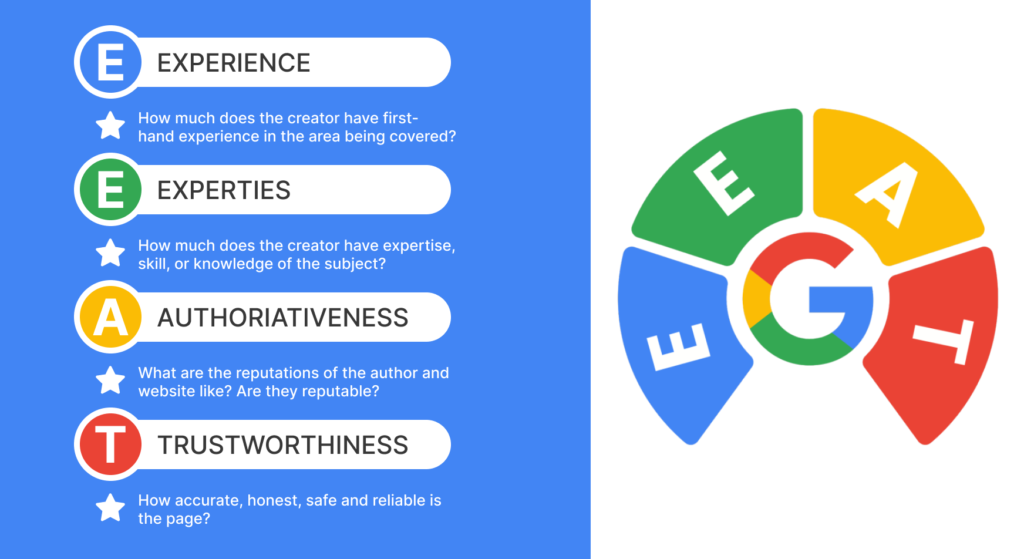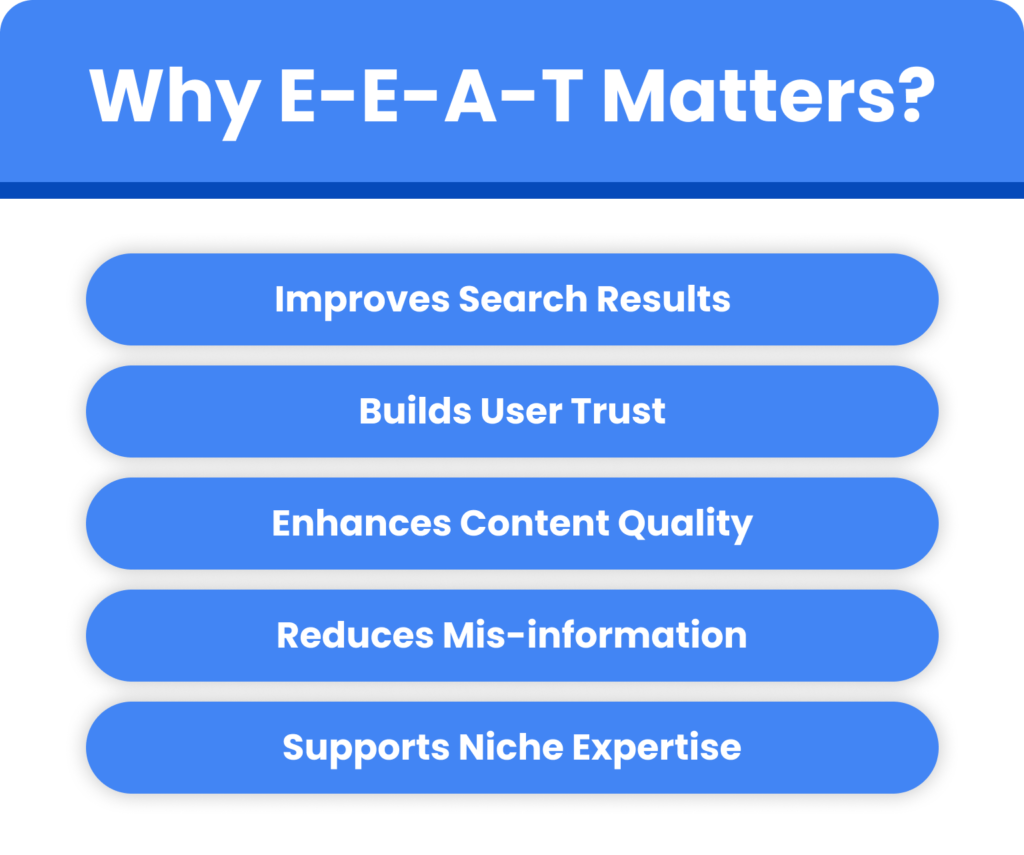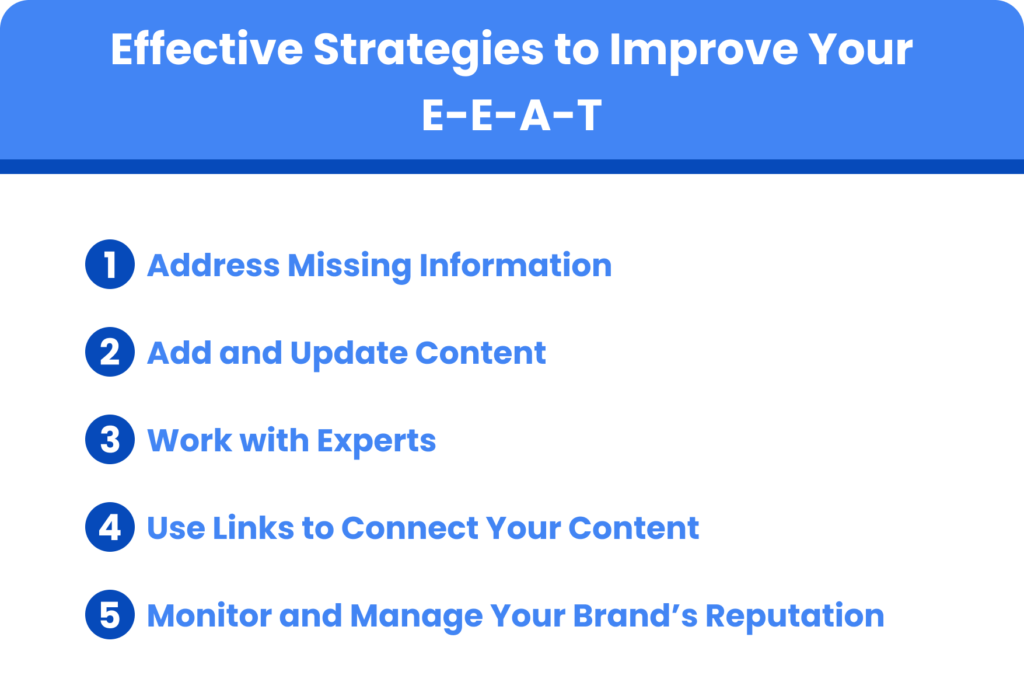Did you know that Google has recently updated its E-A-T guidelines to include an extra “E” for “Experience”? This change means that having great content is no longer enough on its own. To really succeed in SEO today, you need to embrace Google’s new E-E-A-T principles: Expertise, Authoritativeness, Trustworthiness, and Experience and apply effective strategies for Google E-E-A-T.
This update, as detailed in Google’s latest Search Quality Rater Guidelines, highlights the growing importance of providing genuine, first-hand experiences to your audience. It also pushes content creators to offer unique and original perspectives.
Now, Google is not just interested in your content’s expertise, authority, and trustworthiness but also in how well it reflects real-world experiences. In this blog, we’ll explore what E-E-A-T is all about and show you how it can transform your SEO approach. Discover why this effective strategies for google eeat is crucial for your online success and learn how to use it to stay ahead of the competition.
What is E-E-A-T?
In 2014, Google introduced E-A-T guidelines to evaluate content based on three key factors: Expertise, Authority and Trustworthiness. These factors help Google assess and rank content to ensure users receive the best search results. Each year, Google updates its Search Quality Rater Guidelines to refine these evaluations.
In 2022, Google added an extra “E” to create E-E-A-T, which stands for Expertise, Authoritativeness, Trustworthiness and Experience. This new addition emphasizes the importance of content that reflects real-world experience. For example, it values content created by someone who has used a product, visited a location or has direct, relevant experience with the topic.
This update aims to improve how Google assesses content by ensuring it is not only credible but also rooted in actual experience.
Importance of E-E-A-T in SEO
E-E-A-T is important for SEO because it helps you create quality content that ranks well on Google and satisfies users.
While E-E-A-T is not a direct ranking factor, enhancing these aspects helps your content meet Google’s criteria for good search results.
E-E-A-T (Experience, Expertise, Authoritativeness, and Trustworthiness) is crucial in SEO for the following reasons:

Experience
Experience refers to the firsthand knowledge and practical application an author or creator has with the topic they are discussing. This can include personal experiences, professional practice, or hands-on involvement. Content that reflects real-life experiences can be more engaging and credible because it shows that the author understands the subject matter deeply.
Expertise
Expertise involves having a deep understanding and knowledge of a particular field. This is often demonstrated through qualifications, credentials, and a history of work or research in the area. Expertise is crucial for topics that require a high level of accuracy and detailed knowledge, such as medical, financial or technical subjects.
Authoritativeness
Authoritativeness relates to the reputation of the author or the website. It indicates how well-regarded they are by others in the same field. Authoritative content is often cited by other experts, referenced in studies, or recognized by reputable institutions. This demonstrates that the content is respected and valued within the community.
Trustworthiness
Trustworthiness focuses on the credibility and integrity of the content. It means that the information presented is honest, reliable, and can be verified. Trustworthiness is built through transparency, such as providing sources for information, having clear contact details, and maintaining a good reputation with users.
How E-E-A-T Fits into Google’s Algorithm
Google’s algorithm aims to provide users with the most relevant and trustworthy information. E-E-A-T, which stands for Experience, Expertise, Authoritativeness, and Trustworthiness, is a crucial component in this process. Here’s how each element fits into the algorithm:
- Experience: Google values content created by authors who have firsthand experience in the subject matter. This ensures that the information is reliable and authentic.
- Expertise: Google looks for content written by experts in the field. Expertise is demonstrated through credentials, professional background, and depth of knowledge.
- Authoritativeness: Authoritative content is recognized as a reliable source by other experts and websites. This can be measured by backlinks, citations, and overall reputation in the industry.
- Trustworthiness: Trustworthiness is about the credibility of the website and the content. Factors such as transparency, clear contact information, and positive user reviews contribute to trustworthiness.
Why E-E-A-T Matters?
E-E-A-T significantly influences how Google ranks websites. High E-E-A-T scores indicate that a website provides valuable, reliable content, which can lead to better visibility in search results. Google prioritizes these sites because they are more likely to offer accurate and useful information to users.
Websites with strong E-E-A-T provide a better user experience. When users find content that is written by experienced and knowledgeable authors, they are more likely to trust the information. This trust leads to higher user engagement, longer visit durations and lower bounce rates, all of which are positive signals to Google’s algorithm.
Google’s E-E-A-T matters because it helps determine the quality and reliability of content on the web. Here’s why it is important:

1) Improves Search Results
EEAT helps Google ensure that the most accurate, reliable, and helpful content appears at the top of search results. This is crucial for users who rely on search engines to find trustworthy information.
2) Builds User Trust
When users consistently find high-quality content that meets EEAT criteria, they are more likely to trust the information and the platform providing it. This trust is essential for user satisfaction and repeat use.
3) Enhances Content Quality
By prioritizing EEAT, Google encourages content creators to focus on producing well-researched, expertly written and credible content. This raises the overall quality of information available on the internet.
4) Reduces Mis-information
Emphasizing EEAT helps combat misinformation and low-quality content. By promoting content from experts and authoritative sources, Google can limit the spread of false or misleading information.
5) Supports Niche Expertise
EEAT allows specialized content from experts in various fields to gain visibility. This ensures that niche topics are covered accurately by those with in-depth knowledge, benefiting users seeking specific information.
Effective Strategies to Improve Your E-E-A-T
Improving your E-E-A-T can boost your SEO and make your content more effective. It helps you create high-quality, relevant content for your audience.
Here are six simple tips to improve your E-E-A-T:

1) Address Missing Information
If you know what your audience is searching for online, you can create content that covers any missing information. After addressing the main topics related to your product or service, think about what additional details might be useful.
You can find new content ideas by brainstorming or using tools like Semrush’s Topic Research Tool or AnswerThePublic.
2) Add and Update Content
Google likes new content because it shows your site is regularly updated. How often you update content depends on what you create.
If your company publishes big research reports, update your content according to your research schedule. If you run a blog or post weekly webinars, update more often to keep your audience informed.
Don’t forget about your old content. It can become outdated, especially if it talks about trends or uses old data. Check how well your old content is doing by performing a content audit.
After the audit, update your best-performing content or the content that your audience finds useful. Google will notice these updates and reward you for keeping your site current.
3) Work with Experts
No matter the size of your company, working with experts is always a good idea for creating original content that boosts your E-E-A-T.
You can collaborate with knowledgeable in-house staff or hire external experts who can offer new insights or angles on topics related to your business.
Make sure the experts you choose have strong E-E-A-T signals, which means they should have a solid online presence. This could include their social media profiles, personal blogs or websites, or other online publications.
4) Use Links to Connect Your Content
When you make a lot of content, you’ll often cover similar topics. To make the most of this, link your articles to each other.
One good way to do this is by using a hub-and-spoke system. This means you have a main ‘hub’ topic (like social media or SEO) that connects to several related articles. For example, if you have a hub article about ‘popular social media channels,’ you can link to other articles about TikTok, Facebook, and more. You might also have additional articles on specific topics like social media algorithms, which branch out from the main hub.
This helps you show expertise on the topic. By linking these articles together, you strengthen your E-E-A-T.
5) Monitor and Manage Your Brand’s Reputation
Trust is crucial for E-E-A-T, so it’s important to maintain a good online reputation. A negative reputation can harm your credibility and affect your search engine rankings.
To keep track of your brand’s reputation, check Google, review sites like Trustpilot, and look at forums like Reddit and Quora. Social media is also a place where people share their opinions about your brand.
To build a positive reputation, respond to customer feedback:
- For positive reviews: Thank the reviewer and consider asking for a recommendation to showcase on your site.
- For negative reviews: Reply politely, offer to fix the problem, or apologize if needed.
By addressing feedback effectively, you can improve your brand’s reputation and boost your credibility.
6) Focus on Customer Experience
Customer experience is key for Google because it aims to direct people to valuable and trustworthy content that meets their needs. This means the entire customer journey matters.
When users click on a search result, they should be taken exactly where they expect to go. For example, if someone clicks a link to a blog, they should be taken straight to that blog and find the content they were looking for, just as described in the search results.
Conclusion
In conclusion, embracing effective strategies for Google E-E-A-T (Expertise, Authoritativeness, Trustworthiness, and Experience) is crucial for enhancing your website’s trust and authority. By focusing on these key principles, you align your site with Google’s updated guidelines, which can significantly improve your SEO performance. Ensure your content showcases genuine expertise, builds authoritative backlinks, maintains transparency and trust, and reflects valuable experience. Implementing these effective strategies will not only boost your search engine rankings but also build a more credible and engaging online presence. Start applying these techniques today to strengthen your SEO and achieve long-term success.
